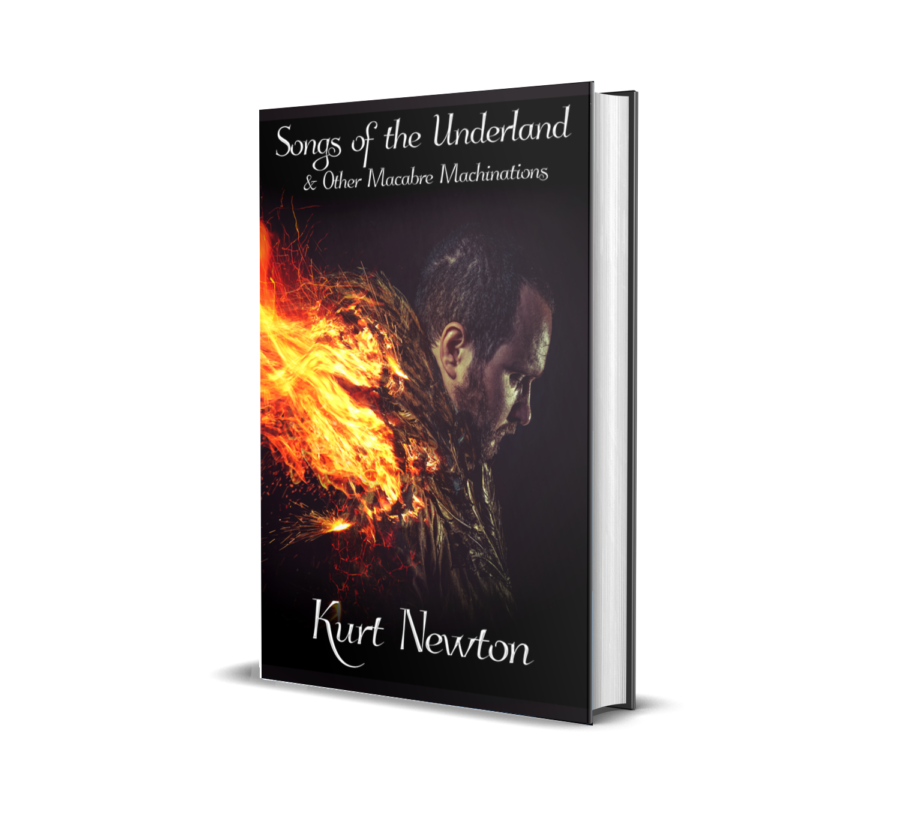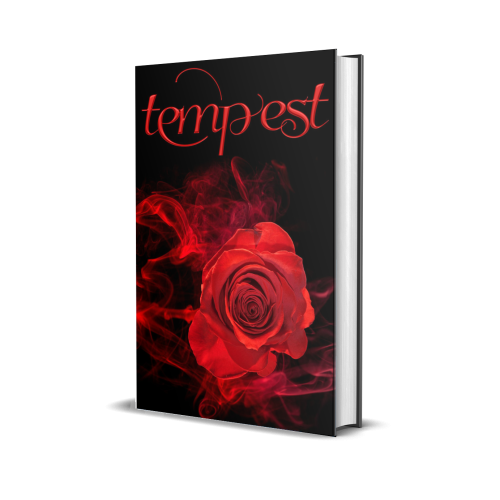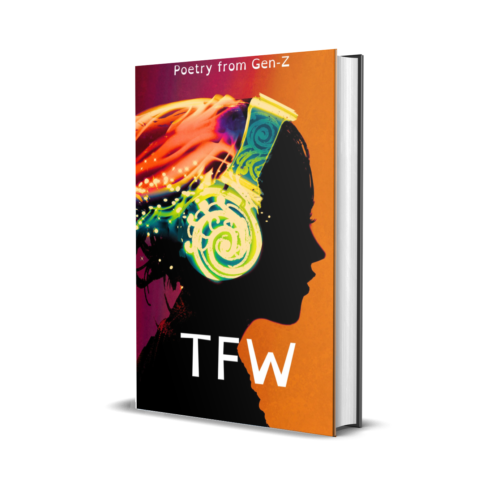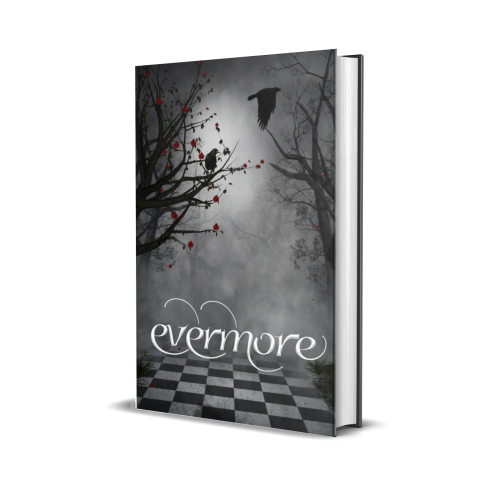💫2023 SFPA Elgin Award Nominee 💫
Songs of the Underland & Other Macabre Machinations
Launch Date : 28th June 2022
Digital : $3.99 USD
Print : Paperback $15.00 USD
Hardcover $20.00 USD
ISBN: 978-0-6454697-3-8
ISBN: 978-0-6454697-2-1
In the poetry cycle, Songs of the Underland, Kurt Newton sets out to describe a nether world of nightmare and shadow where a kind of spiritual penance is meted out. In this hellish landscape of sin and forgiveness, Newton beautifully conveys one man’s quest for redemption with an elegance of language both sumptuously precise and brilliantly lyrical.
Kurt Newton is the author of nine collections of poetry. His dark verse has appeared in the pages of Weird Tales, Strange Horizons, Dreams and Nightmares, Spectral Realms and Cosmic Horror Monthly, and in the anthologies Untimely Frost, Death’s Garden, Darkling’s Beasts and Brews, Putrescent Poems, Burning Love & Bleeding Hearts, Infected, and Trickster’s Treats 4.
Reader Reviews
“Kurt Newton’s collection of speculative poetry, Songs of the Underland, is an achievement both innovative and reminiscent—and yes, I believe both of those can be and have been attained in this impressive tome. Beyond the themes, topics, and content of the poems in the collection, Newton’s use of what I will call “Free Formalism” is both innovatively creative and distinctive.
The first half of the poems in this collection, as promised in the title, refer to, indeed many are set in, The Underland. As Newton explains in his prefatory material, it is a place defined in the first of two foundational poems:
It is a place where nightmares dwell,
where untethered shadows live and breathe,
beneath the pavement of reality lies
a hellish world that one should never hope to see.
As he further notes, the Underland is, “a nether world of nightmare and shadow where a kind of spiritual penance is meted out.” This he further specifies by adding that it is a “cautionary tale” that depicts a zone resulting from the condition in which the spiritual has been superseded by the material.
And to call it a “tale” is key to the understanding of the first section of the poems. It may seem a stretch to say this, but I was reminded of the “lad’s journey” in A. E. Housman’s A Shropshire Lad. Just as with Housman’s semi-autobiographical journey tracing “the lad” from the home vistas of the rural shire to the great city of London, recounting the trials, tribulations, traumas, and discoveries in that rite de passage along the way, so too does Newton’s journey of the soul chronicle and caution against the results of following ill-chosen forks in that journey’s long road. In the establishing early poem, “The Underland,” he writes:
I cannot stress enough the wisdom I’ve derived,the consequence of each and every choice one makes,the lesson not to tread where hatred dwells,not to wallow in the pointless pain of past mistakes,
or one will find oneself alone in a living hell.
The second half of the book, a section entitled Other Macabre Machinations, offers the more conventional collection—at least “conventional” for the contemporary speculative poet of the weird, horrific, and supernatural—of a variety of poems that range from poems on supernatural entities (doppelganger, fetch, the British figure of Redcap) to horrific images as with the visions of “Bone Riders” and “The Black Star Traveling Show.” One masterful sequence of two poems, “The Crows of Las Cruces” and “The Crows of Las Cruces Revisited,” strikes as a strange seeming blend of Hitchcock’s The Birds and the legend of the Pied Piper of Hamlin. Newton also weaves in some homages to Poe acknowledging that master’s influence upon his own work and a couple poems that give a nod to Lovecraft’s mythos. Meanwhile, this second half of the book goes far toward establishing a “mythos” of Newton’s own.
Kurt Newton’s poems are formally distinguished as well. He uses a variety of line lengths and metrical variations, and, while fully rhyming on many occasions, the rhymes are sometimes randomly placed, sometimes even carrying over from one stanza to another. Quite often, they are examples of assonance rather than full rhyme: the echoing of vowel sounds in ultimate words of lines rather than exact repetition of vowel and final consonant. He also makes use of other phonic tropes: alliteration, consonance, and echoes of similar sounds (proximity of both voiced and unvoiced versions of our phonemes). All in all, Kurt Newton has a finely developed sense of poetic rhythm and sound.
The text is embellished with many graphics, several reminiscent of the types of page enhancements of classic pulps such as Weird Tales—into the pages of which Newton’s work would nicely fit.
This is an important collection and well worth the purchase and perusal of a fine poet’s work. Newton is at the forefront of the speculative poets of our time.
“A dark love-letter to Poe, to Lovecraft, to all those damned poetic souls that have gone before, and all who will be raised up after!”
—Steven Dillon, editor/publisher at Things in the Well
“I thoroughly enjoyed being taken on this dark and disturbing man’s journey through the Underland. Flowing seamlessly from one poem to the next, the reader can easily feel as though they’re along for the ride with the protagonist through the demon and nightmare infested hellish land. Taking you through despair and shattered souls, through longing and desire for atonement, Kurt Newton writes a compelling story piece through each expressive poem.
My favorites include “A Dream of Love Unadorned” and “The Chair of Absolution.”
With detailed characters and world building, it’s easy to get lost in this collection of horrifying themes and short tales.
Then, when you leave the Underland and enter into the Other Macabre Machinations, you experience a whole new sea of dread. Some of my favorites include “The Fetch,” “Funeral for Annette,” and “Dancing in the Dark.” The rhyming used throughout the entire book was as if the collection had a background song, guiding you along the journey.
For me, it’s one of those poetry collections where I wish you could reread it again for the first time.
So many what if’s of nightmares and ghoulish thoughts turned into lyrical pieces. You’ll get goosebumps and double check the area around you the next time you think you’re alone in the dark.”
—Brianna Malotke, poet & author
“Kurt Newton’s 9th collection of dark verse, Songs of the Underland & Other Macabre Machinations, is easily divided into the two halves suggested by the title. The first half, Songs of the Underland, is an epic morality adventure, divided into twenty loosely rhyming chapters (or songs), full of evocative horror, melancholy, and desperate hope. While most of the individual poems that follow in the Macabre Machinations half tend to be better crafted and some more emotionally profound, the Underland saga was so consistently, fascinating in its themes and art, that when I had finished the book, it was the Underland tale which haunted me long afterward, and still does.
Newton takes evident inspiration from such horror masters, including H.R. Lovecraft, but particularly Edgar Allan Poe, who he expressly credits in two of his poems, as a muse. But even without naming Poe, Newton’s narrative tone, like sad or haunting tales told privately after several drinks in the shadowy corner of a bar, is inescapably reminiscent of the dark bard. On the whole, Songs of the Underland & Other Macabre Machinations is a powerful collection sure to satisfy fans of macabre poetry. It is worth savoring repeatedly.”
—Shawn M. Klimek, poet & author
“A cautionary tale on the road to redemption, Kurt Newton’s Songs of the Underland & and Other Macabre Machinations is an unsettling yet tantalizing exploration of a soul descending into darkened worlds of nightmare, guilt, and deep ontological angst. Deftly connected to theme, these poems are filled with the rhythms of both courage and profound reticence as they mine the acute trepidation that dwells at the heart of the human condition, born of sin and forgiveness, regret and penance, and “where personal ambition supersedes love” and “where the quest for the material supersedes the spiritual”. While actively throwing caution to the wind, and despite a creeping sense of doom and strained divinity that pulls at the tattered threads of our humanity, Kurt remains steadfast and hell-bent in his quest to honestly and fearlessly expose the raw and gritty battleground between good and evil that exists in each of us.”
—John Drudge, poet & author






